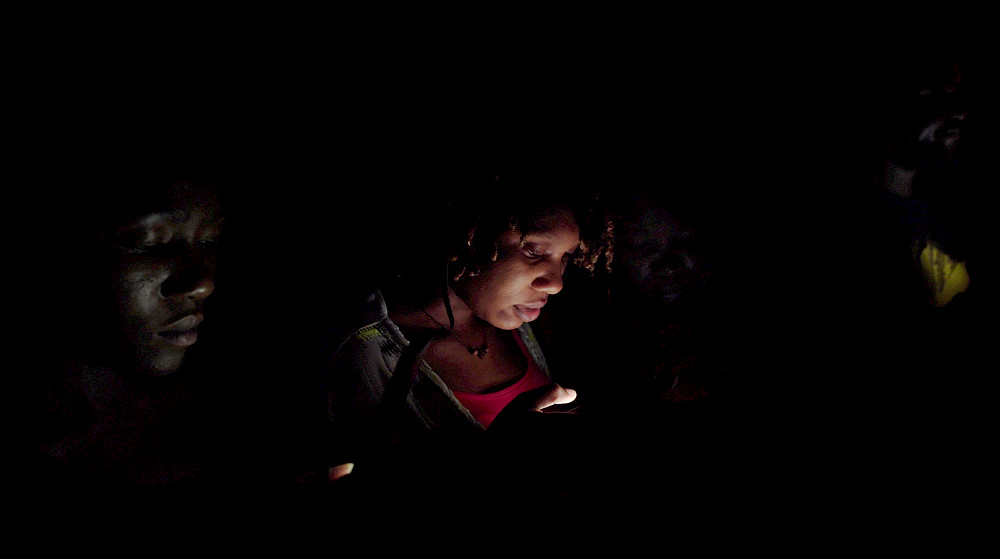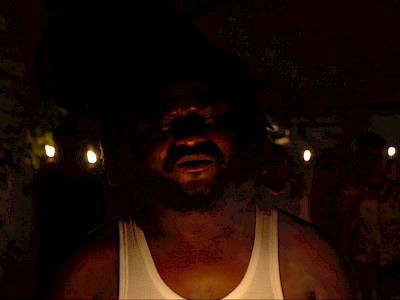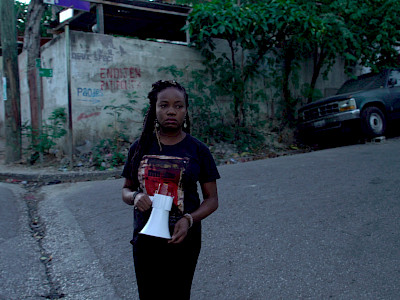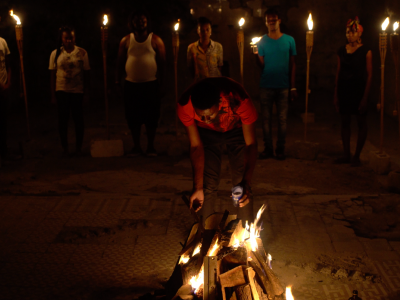20 — 23.05.2021
The Living and The Dead Ensemble Port-au-Prince
The Wake
theatre / performance / installation — premiere
French, Haitian, Guyanese Creole → NL, EN | ⧖ 1h
The Wake is a performance reflecting a fragmented geography, a broken mirror of the complexity of the world. It is made of intimate stories and fables, songs and cries of revolt, demands and delirium. It is an assembly trying to make itself heard: is there a possible future beyond the repetition of catastrophes of all kinds? Is there a common fire to be shared with those who have lost their voice or never had it? The Living and The Dead Ensemble is a group of artists, performers and poets from Haiti, France and the UK. While writing this uncertain journey through space and time, they also read fragments of the play Melovivi or Le Piège (“The Trap”) of the Haitian writer Frankétienne, a work anticipating the earthquake that would devastate Haiti ten years ago. By referencing this work, The Wake becomes today a space that anticipates a new future. The Wake is also presented online, in a video of the performance that combines physical presence and fragments of scenes shot in Clichy-Montfermeil and Haiti.
Polyphony for The Wake
The Living and the Dead Ensemble
Impossible, we believed, to avoid the beginning. Just like when joining an ongoing discussion or taking a front-row seat in the middle of a film, we are disoriented. Accordingly, The Wake takes the norm by the tail. A first success. We wait for the thread to unravel. First access, a colour. A first voice as a point of reference, and little by little others approach, coming to mingle with the first thread. And oh! There’s already a rope. Not the memory of the journey, but nonetheless an awareness of the present moment. Good news, we are not lost. And then we hear a voice, and other familiar voices in the mouths of others. Other bodies that feel the same jolts and that bear the same traces as ours. We meet, the map takes shape. Yet it is difficult to anticipate the next steps. We move forward confidently, despite everything. Our mouths painted with poetry. We can already see a glimmer of hope, the fire in the distance, towards which we are gradually moving, the tremors of the world on our tired shoulders. Whoever wants to, throws their burden into the flames. This is the ritual. Turning our lament into smoke, and letting it evaporate to the high places. Some voices still hesitate, awaiting the act and the green light of effectiveness. Then in the full light of day they will approach, oppressive gazes flushed away. Finally the gesture. And the flame grows. The Wake is an invitation to a gathering worthy of our torments. A magnet for our cries. The bitter taste of opposing winds.
Within the most morbid constraint,
The Wake opens on realities situated in the register of the unthinkable
You laid bare assassinations that some take pleasure in covering up
Oh The Wake!
An awakening to the state’s lethargic sleep
Faced with turpitudes, you claim your right everywhere and Elsewhere
From earthquake to emotion
The fire stirs up your stance
Oh The Wake!
Accused of cock and ass, because your subjects remain unshakable
Oh The Wake!
I love when you turn back, when slavery and neo-colonialism go hand in hand
At the edge of the cliff of desecration, you invoke the sacred
Oh The Wake!
You do not cease to evoke in equal part the value of the human being stuck in a world without equality,
The work of memory for forgotten acts…
Unarmed, The Wake uses the verb to combat the void. In an oppressive darkness, the unpleasant phrases of our reality are born, sculpted by unbridled and sometimes discordant notes, which try to conjugate the world in its modes and times. Intertwined spellings, chants, sighs, cries… determine our words, overflowing with anger and indignation. From one voice to another, the harmony of appalling facts borrows the alphabet of injustice. We exteriorise the jitters of our daily life. For some, it’s the fear of not being able to escape a deteriorating situation that profits oppressors. A dance, gestures that tell a story, drumbeats rhythmic under our feet, directed by the conductor who is our pain. It is a demonstration, a festivity of revolutionary beauty. The Wake, like an incantation, chases away the spirits who would have us believe that everything is acceptable under the empire of inequality and the masked reign of dictatorship.
The Wake, a ‘tchaka’ or even a ‘djak’, as it is called in my homeland of Haiti; a simmering stew containing whatever the mouth can eat. In Voodoo, we speak of ‘Manje Ginen’, the food of our ancestors.
And voilà, The Wake, in the image of The Living And The Dead Ensemble; “Ti rat pa konn fèt san ke”, “like father, like son”. The Ensemble weaves together the fragments of our ten experiences, Europe (France, England), and the illegitimate father of the fruits of slavery (Caribbean, Haiti).
The Wake, a whole, a mixture, a multifaceted brew (poetry, rap, slam, story, song, theatre) plays with the body and the voice, which are the only channels within our reach to convey the different kinds of claims made by an oppressed people. Oppressed, but proud, inventive and combative. The people of the future.
The Wake is sourced from our encounter in July 2019 with Clichy-Montfermeil, a city on the outskirts of Paris, destined to take shape in January 2020 in Port-au-Prince.
Port-au-Prince, 12th January 2020. That evening, we ended up cancelling our performance of The Wake at Lakou Tokèt – but what did it mean, for the eight Haitian members of the Ensemble, to return to personal stories from exactly ten years ago to that day? What would it mean, later, to position these stories in relation to another story from another time; Mélovivi ou Le Piège by Frankétienne? His play, written two months before the goudougoudou (earthquake) devastated Haiti, features two characters; A & B, “… besieged by debris and corpses”, and seemed to predict the chaos that would befall Port-au-Prince on 12th January 2010. In the repetition of Mélovivi by the Ensemble, incorporated into The Wake as fragments, with the characters A & B fractured into eight bodies that protest against the chaos of the present, can we find a kind of return that moves forwards in space and time? Could this gesture perform “a prophetic vision of the past” which, through infinite rehearsal, creates a detour in the shape of a spiral?
The Wake is a work that makes all interventions possible. “Off topic, out of context, it doesn't exist,” as Franketienne said during a conference at the Port-au-Prince Centre for the Arts. The Wake is an aesthetic proposition that shies away from classical forms. We live in chaos, everything is intertwined. It is also a work in dialogue with Mélovivi ou Le Piège. It adapts itself to the current deleterious situation of the world. Everywhere people are protesting against those in high places who abuse their positions. The Wake puts our anguish, our pain into the chapter. For it is the machine of the industrialised world that directs us with its discourse. Globalisation does not unite us, it creates borders of preference. With The Wake, we deconstruct in order to better recreate our own world, overhauled, egalitarian.
The Wake … The vigil …
Yon bagay ki makonnen nou … A space that binds us, that brings us together …
Yon espas ki makonnen isit lan ak tout kote alawonnbadè …
A space that brings together the here and the elsewhere …
The Wake … The vigil …
Sa vle di nou makonnen kit or isit kit or lòtbò dlo …
Meaning that we are together no matter where you are, here or elsewhere …
Paske nou sanble … Paske n ap viv menm katchaboumbe a …
Because we look alike … Because we live in the same chaos …
Paske nan zòrèy nou se menm rél la, rél latè k ap depafini …
Because we hear the same rumbling, that of the crumbling earth …
In the beginning was chaos
Now chaos reigns
On this island where we speak to you
In the midst of this chaos …
There is poetry …
There is a poet who inspires
This poet who relates the madness of this island, the madness of this ground that is slipping away …
In the midst of this chaos
There are poets
There is us
There is our story
This story that we would like to tell you
And you?
What is your story?
The Wake is a journey towards understanding, towards sensitivity. It is a space caught between a past, a present and a future, entangled in a spiral carried both towards the real and the imaginary. It is a means of denunciation, an opportunity to say no to the disguised dictatorship, to say no to a neocolonialism sprinkled with airs of technology which only reinforce pre-established borders. It is a space of sharing, the sharing of sorrows and struggles. It is a battle towards an inclusive world. It is a story of women and men told and retold with and by them. It is an intercultural meeting where differences complete us. It is, for us, an opportunity to say what we are, who we are, without half measures, and without pretence…
The Wake takes the form of a new era. By working on experiences, daily life and the future, it is everyone’s story that’s being told. It is a collective battle, one voice that attempts to take the place of another, things said and things unsaid, the cacophonous songs, the bodies that blend together in all their definitions. Visibly. The news of what is happening in Haiti, as in Clichy-Montfermeil, constitutes the heart of The Wake. Social and racial inequalities, police abuse, injustice. Where did PetroCaribe’s money go? “A question that is timidly extinguished.” Neglected youth during a time when the world is becoming chaos, where rage manifests itself. A struggle that requires resistance, sharing, interaction with one another, communication, understanding, and, above all, attention.
The planet catches fire...
The Wake is an infinite piece, unfinished, never finished and always pretending to end for the better, to expand differently, elsewhere, into a new secret. Here, it is the word that creates the place, a habitable but precarious place that welcomes the fire of the world, a place that moves. Speak up to demand justice, at the risk of being dispossessed yet again of the last thing you have: a breath, a voice. And so speaking in this context is also a ruse and a protection, a way of speaking in order not to speak, of de-speaking. Thus the paradox of The Wake is that, like a riot – it cannot quite be a theatrical performance, only a lived moment. And it is for this reason that everything is endlessly escaping into the shadows at the back of the scene, in a blending of languages, characters and memories, of literature and slogans, into a joyful cacophony that is also a way of being in the world.
Presentation: Kunstenfestivaldesarts-Zinnema
Directors: Louis Henderson, Olivier Marboeuf | Performers: Rossi Jacques Casimir, Dieuvela Cherestal, Sophonie Maignan, Cynthia Maignan, James Desiris, James Peter Etienne, Mackenson Bijou, Leonard Jean Baptiste, Olivier Marboeuf, Louis Henderson | Coproduction: Kunstenfestivaldesarts, Spectre Productions, Le théâtre de l’Usine, Les Ateliers Médicis, Z33, Savvy Contemporary




